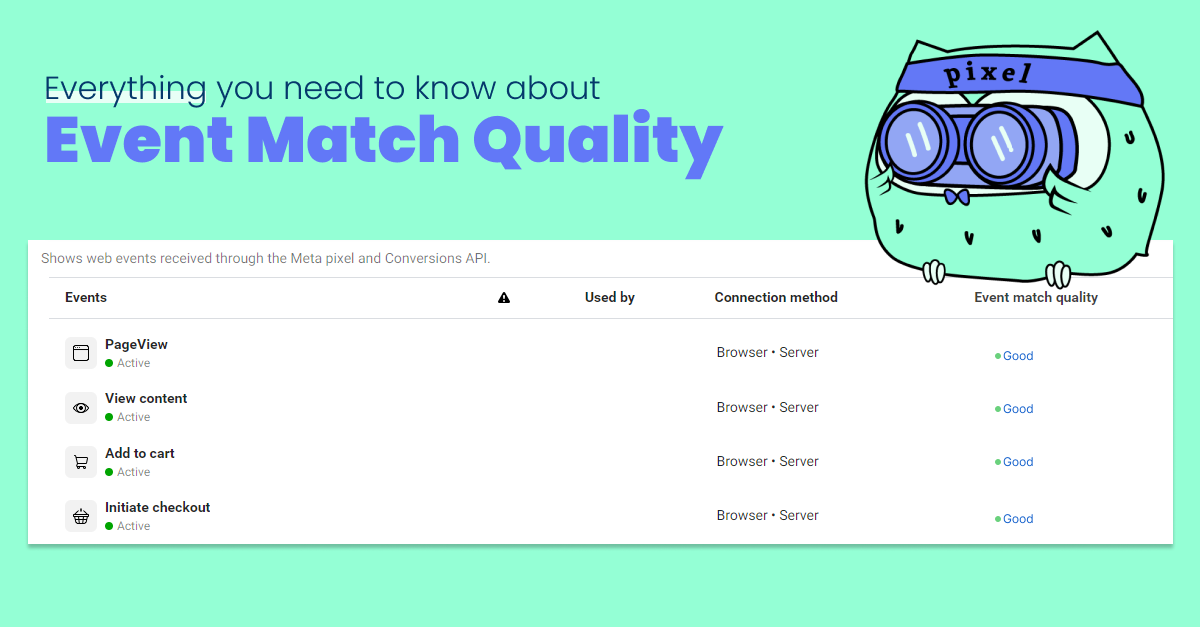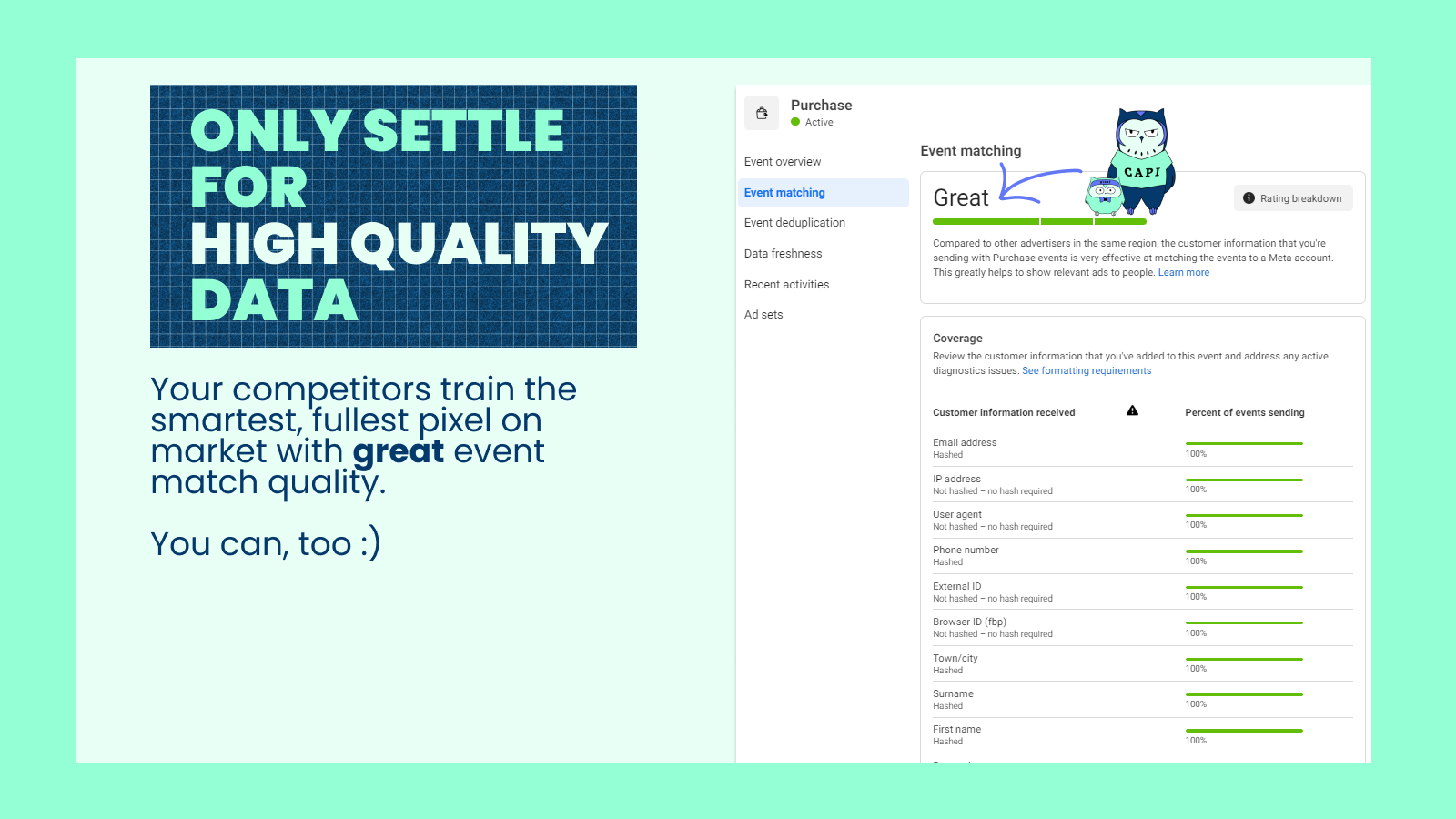
What is event match quality on Facebook?
Higher Event Match Quality is always better. So what is it that no matter how challenging, seasoned advertisers are on a quest to improve it?
Generally speaking, it’s just a signal telling you how your tracking is optimized for Facebook success. EMQ indicates how good the data you send at helping Facebook to understand who (which Facebook profile) performs the event you send. All for solving 2 questions: Which ads bring which conversion, and who to deliver ads to.
Customer information data at the core of events
Before diving into detail, let’s first start with something simpler. The concept of an event.
You are probably familiar with events. It’s what visitors do on your eCommerce store. Standard eCommerce events that Facebook supports right out of the box include:
- Page View: When a page is loaded
- View Content: When they view a product page
- Add to Cart: When they click the ATC button
- Initiate Checkout: When they proceed to checkout
- Add Payment Info: When they added their payment info to complete the order
- Purchase: When they have finished placing the order.
If you think of Pixel (or CAPI) as Santa delivering gifts, each event is a gift bag. Whether Facebook loves what it receives from the Santa depends on what’s actually inside the bag. The more customer information inside the bag, the higher EMQ the Santa gets.
Why does Facebook love customer information parameter?
Suppose I throw you a bag (event) and tell you to find the exact person who performed it on your site, how would you even begin? Tying the knots from a random event back to a Facebook profile, out the the 3 billion of them is a tall order. That’s why Facebook needs some hints about the event.
The more info it can have about the event, the less anonymous the event is. So by improving your Event Match Quality, you’re doing Facebook (and your wallet) a huge favor.
Once the match happens, Facebook can report on which campaigns the conversion originates from, and also who are your audience.
Why Event Match Quality matters
More accurate campaign performance report
Have you seen campaigns performing worse than they actually are?
That’s because Facebook struggles to attribute conversions (events) back to a campaign. Apart from the Event loss due to the IOS 14, there will be times when Facebook has no idea how to connect the events back to a person.
If you don’t want to have your head in the clouds when it comes to understanding your performance, please do your best to pack every customer info possible in an event. This is to help Facebook report a picture most close to the truth for you.
Optimize your ad delivery
Facebook algo relies on your past converted audience to decide who to best deliver ads too. Imagine, your campaign is converting, but since the lack of customer info, no match happens. Facebook thinks your campaign or the previous audience is underperforming so it shifts strategies. You end up with a subpar audience who won’t buy from you.
It’s dangerous to shoot in the dark like this when you have a tight budget.
How Event Match Quality is calculated
The maximum score you can get is 10 out of 10, though this is likely impossible.
When it comes to scoring your EMQ, 3 things are taken into consideration:
- The variety of customer info parameters you send with the events.
- The value/integrity of the info you sent
- The actual match percentage
Though no one gets the exact equation and how each plays in a better score, the ultimate goal is to send the maximum valuable data with the maximum events possible
Event match quality is calculated daily.
What customer information parameters is Facebook accepting?
There are so many ways you could list them. But normally the data is grouped into hashed and unhashed data.
- Hashed data – Data is encrypted to prevent leaking. It includes anything that links to user’s personal details, such as first name and last name, email, phone, birth date, and geographic address.
- Unhashed data – includes Facebook user ID, user agent, IP address, browser ID (fbp), click ID (FBC).
Are all the data parameters equally important for your Shopify business?
When it comes to these parameters, not all carry the same weight.
There are data that no 2 people carry the same one. That’s when Facebook can exactly pinpoint 1 person match. Think email, and phone number. This is called deterministic matching.
When the data is shared between many people, it’s not a good option to figure out who is actually behind the event. E.g. many people have the same name. That’s when Facebook needs some probabilistic matching to carry out its job.
You can roughly guess that deterministic data is more valuable.
In fact Facebook has a priority for using those data to match back to a person.
| Customer data parameters | Priority | Details | Match type |
|---|---|---|---|
| Hashed email | Highest | The visitor’ email address, captured mostly when they complete orders | Deterministic |
| Client IP address/client user agent | High | Captured for every events | Probabilistic |
| Hashed phone number | High | Captured mostly when they complete their orders or fill out a lead form | Deterministic |
| Facebook Login ID | Medium | Captured when there is a need to login with Facebook from your site | Deterministic |
| Other hashed contact information ( gender, date of birth, last name, first name, town/city, country/state, postcode/zip, country) |
Medium | Captured when they login to the store, after they complete payment info, or fill a lead form. | Probabilistic |
| External ID | Medium | A unique value is assigned to identify an event upon sending. Next time you sent other events with the same external ID, Facebook will figure out that this event comes from the same person who has the same external ID. | Probabilistic |
| Browser ID | Low | Information about the browser visitors use when performing the events | Probabilistic |
| Click ID | Low | Unique to every ad click. When someone clicks off Facebook from a Facebook Ads, the fbclid is appended to the URL. | Deterministic |
Every road leads to Rome, but not every road costs the same amount of gas. The highest priority ones are the ones that bring the best results with less work.
What is an average event match quality score?
Just as no data parameter is created equal, the EMQ varies from event to event.
Page View and View Content events suffer the worst match quality. This is mainly because these events are captured when the visitors leave the site when they haven’t provided any data.
Quality scores for such events tend to range from 3/10 to 5/10.
Other events, such as Add Payment Info and Purchase should include much more customer information since visitors would typically have shared at least some personal details at that stage in the funnel.
You should expect a score of 6+ for those deeper-in-the-funnel events.
Doesn't peek your interest? Luckily, there is actually a way to bring that score to the next level. I'm talking about Great to Excellence quality with Score ranging from 9-10.
How do I achieve Great event match quality on Facebook?
Now that you understand thoroughly how EMQ works, the answer is simple.
Just send as many customer data parameters as you can collect. However, it’s never an easy task to set that up.
If you don’t have a dev team or tech resources, this could turn out to be a nightmare. Every too often, wrong implementation results in low Event Match Quality.
If you want to save time and get an unfair advantage, it’s highly recommended that you check out this best Pixel tool on Shopify, which covers all the best practices on autopilot.

Happy tracking :)
